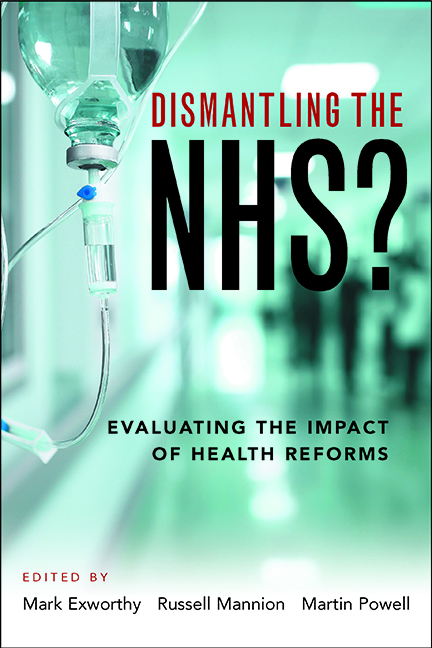sixteen - ‘Groundhog Day’: the Coalition government’s quality and safety reforms
Published online by Cambridge University Press: 05 April 2022
Summary
Introduction
Quality and safety are defined and measured in different ways by academics, commentators and agencies, while the relationship between them are viewed in different ways (Leatherman and Sutherland, 2003; 2008; Raleigh and Foot, 2010; Vincent et al, 2013). The US Institute of Medicine (IoM, 2001) provides a ‘long list’ that healthcare is high quality if it is safe, effective, timely, person-centred, equitable and efficient (Raleigh and Foot, 2010; Gardner, 2015), but this has often been reduced to a ‘short list’ of three dimensions. Raleigh and Foot (2010) write that while the definitions of quality vary in different settings, some themes – safety, effectiveness and patient experience – are common to most quality frameworks (for example, IoM, 2001; DH, 2008; NQB, 2013), and are regarded as the three pillars of quality in healthcare (Doyle et al, 2013; NQB, 2013; Swinglehurst et al, 2015).
As Donaldson and Darzi (2012) put it, however, in the first 50 years of the NHS, quality was implied but not made explicit (but see Thorlby and Maybin, 2010), perhaps assumed not to be an issue due to the ‘best in the world’ mantra (see Chapters 3 and 17). Issues of quality and safety in healthcare became more central about the turn of the twenty-first century, with important reports in the UK and the USA (Kohn et al, 1999; IoM, 2001; DH, 2000b).
This chapter examines the three pillars of safety, effectiveness and patient experience (compare DH, 2008). After a brief review of earlier periods, it focuses on reforms in England under the Coalition government. It then explores the impact of reforms on quality and safety, providing a wider comparative perspective.
Historical background: quality in the NHS 1948–97
Although rarely explicitly addressed, there were occasional concerns over quality in the early NHS. Vincent et al(2013) provide a chronology of events related to patient safety in England in the twentieth century including the Confidential Enquiry into Maternal Deaths (1952), the Safety in Drugs Committee (1963), and inquiries into failures at Alder Hey Hospital; Ashworth Secure Hospital, and enquiries into doctors – Rodney Ledward and Harold Shipman (1990s).
- Type
- Chapter
- Information
- Dismantling the NHS?Evaluating the Impact of Health Reforms, pp. 323 - 342Publisher: Bristol University PressPrint publication year: 2016



